The game
Deaths started early in 2003, with the legendary and well-known WWI aviator "Nap" Botterell on 3 January, and continued right to the end of the year with the slightly better-known legend Bob Monkhouse on 29 December.
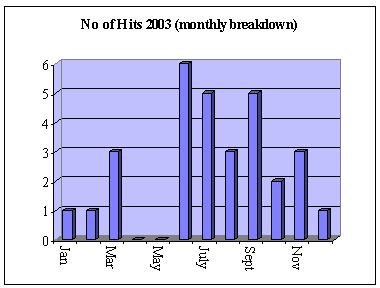
There was no discernible pattern in the frequency of deaths throughout the year, other than that the second half of the year was higher-scoring than the first – 11 deaths in January–June compared to 19 in July–December (with June having more hits than the preceding five months added together). Perhaps this is to be expected, as those subject to healthwatches succumbed to illness as the year wore on. Surprisingly enough the summer months score more highly than the winter ones – and at least one hit (Diana Mosley) was as a result of the unusually hot weather (avoid Paris in August!).
The sustained rise in numbers of hits since the first DDP in 1996 shows a "healthy" participation on the part of sick gamesters, who are able to pick new names from the field as old favourites pass on. Despite the fact that 2002 bucked the trend towards more teams and more selected celebs (due to the uncertainty as to whether the game would be running at all), this increase in hits continued.
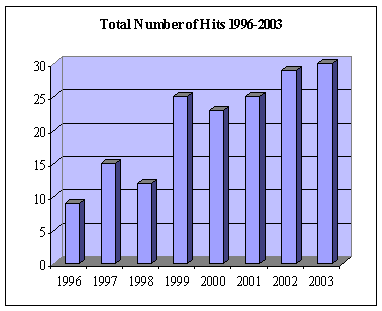
It also disproves the suggestion that once a small number of high-profile frequent choices die the Dead Pool might run out of steam. There is every indication that even though several very familiar names won't be eligible for next year's game, teams should be able to make up the numbers with a selection of new favourites (and not a few one-off and wacky choices).
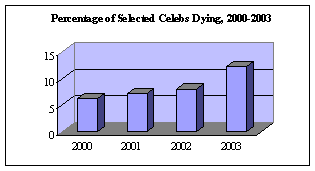
DDP 2003 had a record number of dead celebs, with 30 choosing to participate on a point-scoring basis. Although this was only one more than 2002's figure, a straight comparison ignores the fact that 2003 was a much smaller game, with only 246 nominees as opposed to 361. A truer measure of the rise in hits would be to point out that 12% of choices died this year, as opposed to 8% – the graph shows that this, again, is an increasing trend.
The number of hits per team was also fairly healthy – all but one team scored and three teams managed to get seven hits.
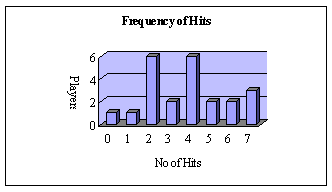
Due to the bonus system five teams (The Raven, Rude Kid, Drummerboy, Whittaker's Choice and Jesus Jones) got equal or higher scores than other teams who had actually scored more hits.
The choices
The teams are, of course, not self-selecting and any congratulation for individual high scores or any overall increase in scoring should go to the players. As has been said, 12% of choices proved to be scoring ones, and overall 443 points were scored by our 24 players (an average of 18.46 points each). Only one player failed to score any points at all and Otis' winning score of 43 equalled the game record set by Nick J's remarkable effort in 1997.
Old faces or original choices?
Unique picks attract a bonus point and therefore are more attractive to some teams (indeed some teams relish in choosing the obscure). However, is there a tangible benefit in choosing unique picks?
Of 246 celebrities nominated a staggering 65.45% (161) were unique picks – of these, 14 died. Thus 8.7% of unique picks died compared with 12% of overall picks and 27% of those in the top ten. The question of whether it is worth making obscure choices and therefore earning slightly higher points is very finely balanced when considering the reduced likelihood of the choice actually dying (though the rule change about what constitutes an obituary tipped the balance in favour of the obscure).
The teams that (by accident or design) tend to choose more obscure picks can be identified by a completely useless and over-complicated exercise resulting in an Originality Quotient (and, yes, I know it's not a quotient). This allocates each team a number by adding together the total number of teams on which their choices appeared: a unique pick scores 1 point, so Bob Hope scores 13 points as he was picked by 13 teams. For ease of calculation jokers are ignored. Theoretically the most original team (consisting of 20 unique picks) would score 20 points and the least original (consisting of the top 20 choices) would score 137.
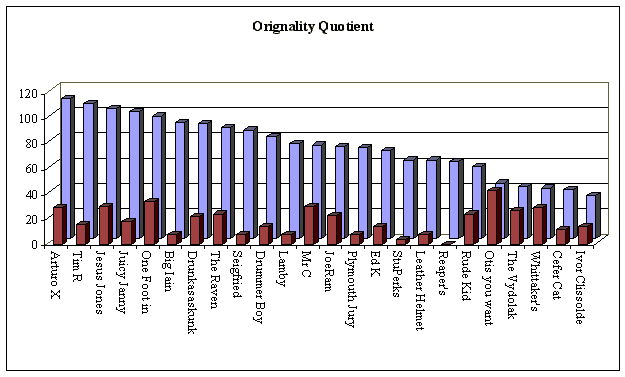
From the graph, it can be seen that Ivor Clissolde chose the most original team (with an OQ of 34 points) and Arturo X the least original (an OQ of 111 points). However, by superimposing the final scores onto the graph, it becomes clear that originality has very little bearing on the final result and that those placed highest on the scoreboard are equally likely to appear at either end of the OQ.
In the end it's a choice that individual teams will have to make – some will decide that the reason an individual isn't being chosen by anyone else is that nobody thinks that he/she is going to die, and that the reason everyone is plumping for a frequent choice is, in fact, that he/she is very likely to die. Having unique choices may strike some as elegant, but if they don't die, they don't earn points!
It's also probably fair to say that some teams' selections don't take these issues into consideration. Some celebs may be chosen because they are more likely to score, some because if they scored, they would get extra points, and others on thematic grounds. Not being privy to the secrets of the game organisers, I don't know how many individuals submit more that one team and may therefore have two sets of criteria. (For example, Arturo X and Ivor Clissolde, at either end of the OQ, could be the same person!)
The criteria for some teams is hidden from the casual observer. For instance, past champion Whittaker's Choice is known for choosing aged and obscure celebs (and rated an OQ of 40). However, age or obscurity are not the deciding factors for inclusion on the team. At the end of 1999 two players, Ed K and Morphonious Quenge, were discussing their likely choices for the forthcoming competition and it was suggested, given that the obituary pages were full of people nobody had heard of, that a random choice from Whittaker's Almanac would probably do better. From this, the Old Farts team was born – and did well enough in 2000 to be rebranded as Whittaker's Choice, in which form it has played ever since. Selection has never quite been random, but all members of the team can be found in the Almanac. Other players surely have similar stories.
The winning team
Otis, You Want A Treat? is this year's winner. There's no doubt of that. His score of 43 points by 7 hits equals that of Nick J in 1997, which, before the advent of Jokers, required 9 hits.
What can we say about this team?
Without going into too much analysis, there are four points that contributed to his success:
- Seven died – when it comes down to it, more people on Otis's team died than on most other people's (only One Foot in The Grave and Mr C also got 7 hits).
- He used bonuses (three points for unique choices).
- He scored with his Joker (Warren Zevon, earning 10 points).
- There were no penalty points.
There's every indication that this was a result of good choices rather than sheer luck. Otis took the lead with the third hit of the year back in March and, although a few came close, wasn't overtaken.
Special awards
These awards are my own and made up by me – they should not be taken as "official" or approved by our esteemed organisers. The winner of the competition, of course, is Otis, You Want A Treat?
Nobody gets anything other than the dubious reward of being recognised as, or by, a smart-arse.
Team awards
- Best name: Otis, You Want A Treat? Like many of the names on the board, this one probably has a hidden meaning, but we liked it. It may be an American thing. Apparently, it's had an impact on the 2004 teams, which are much more interestingly titled.
- First off the mark: Ed K's five points for "Nap" Botterill in the first week of January proved a good start, but he soon ran out of breath.
- Cloud of dust award: Otis took the lead in March with the third hit of the game. Since then all the rest of us saw of him was his back.
- Ambulance chaser: congratulations to Arturo X, Drunkasaskunk, JoeRam, One Foot in The Grave, Otis, You Want A Treat? and The Raven for spotting a contender (Warren Zevon). They won't sell many ice creams at the speed, though...
- Barry Crier memorial award for best joker: seven teams scored 10 points by crafty use of their jokers and share this award - Otis, The Raven, Drunkasaskunk and JoeRam for Warren Zevon; Whittaker's Choice for Paul Daisley; Drummerboy for Barry Sheene; and Rude Kid for Johnny Cash.
- Bonus/penalty award: other than through use of jokers, nobody ended up scoring more than 6 points, or less than 4, for a single hit by the use of bonuses or penalties. This category is left unawarded this year... Honourable mention should go to those teams (The Raven, Rude Kid, Drummerboy, Whittaker's Choice and Jesus Jones) who, because of the bonus system, got equal or higher scores than other teams who had actually scored more hits.
- Brown nose award: to myself for deciding to give Rude Kid and Siegfried Baboon an award for keeping us all going – thanks guys!
Team members
- Early starter award: "Nap" Botterill, who died on 3 January and set the whole thing rolling before we'd got rid of the empties.
- Choice of the year: Warren Zevon, who came from nowhere to make a mark on the top ten choices board at number 8, picked up the highest number of jokers, and who died on 7 September. The six teams who chose him (Arturo X, Drunkasaskunk, JoeRam, One Foot in The Grave, Otis, You Want A Treat? and The Raven) deserve a pat on the back for research and knowing how to play the game. He scooped 5 points for Arturo and One Foot, and 10 points for the joker-playing Drunkasaskunk, JoeRam, Otis and The Raven.
- Most valued player: Bob Hope, for being an old trooper and contributing a massive 64 points to the scoreboard.
- Most valued player (2) (because I can): Warren Zevon scored an average of 8.33 points for each of those who chose him. Barry Sheene skidded into second with 7.5 points, but there are no prizes for second place.
- Most crackling villain: Jack Elam. We'll not see his like again.
- Least missed: Idi Amin. Has anyone seen my Idi Amin?
- Most missed: Katharine Hepburn, for being a class act.
- Award for messing with the numbers: this special award at the expense of the poor drudge who did the faux statistics is shared by Edward Teller (who proved to be a physicist and not a magician's assistant) and Lee Kriendler (who was a man). Anyone who cares to pull at the loose thread that will bring the roof crashing down on our inane analysis is welcome to do so.
- Award for graphic representation: shared between Gertrude Ederle and Barry Sheene, for allowing whimsy on the scoreboard graphic. No-one noticed the lawyer represented by snake-scales, so he doesn't count.
Read on for more end-of-year analysis...